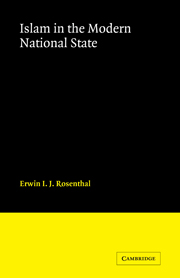Book contents
- Frontmatter
- Contents
- Introduction
- Acknowledgements
- Abbreviations
- Note on transliteration
- PART I CONTEMPORARY ISLAM IN CRISIS AND TRANSITION
- SECTION 1
- SECTION 2 ISLAMIC OR MODERN NATIONAL STATE?
- 3 Islam and Turkish Nationalism
- 4 For and against the Khilāfa
- 5 Islam and Arab Nationalism
- 6 An Islamic State for Pakistan?
- 7 Ἁllāl al-Fāsī: a Blend of Islam and Arab Nationalism
- PART II ISLAM IN THE MODERN NATIONAL STATE
- Epilogue
- Notes
- Select Bibliography
- Index
7 - Ἁllāl al-Fāsī: a Blend of Islam and Arab Nationalism
Published online by Cambridge University Press: 05 September 2013
- Frontmatter
- Contents
- Introduction
- Acknowledgements
- Abbreviations
- Note on transliteration
- PART I CONTEMPORARY ISLAM IN CRISIS AND TRANSITION
- SECTION 1
- SECTION 2 ISLAMIC OR MODERN NATIONAL STATE?
- 3 Islam and Turkish Nationalism
- 4 For and against the Khilāfa
- 5 Islam and Arab Nationalism
- 6 An Islamic State for Pakistan?
- 7 Ἁllāl al-Fāsī: a Blend of Islam and Arab Nationalism
- PART II ISLAM IN THE MODERN NATIONAL STATE
- Epilogue
- Notes
- Select Bibliography
- Index
Summary
By contrast, Ἁllāl al-Fāsī is really at home in both Islam and Europe. A Qur'an scholar of distinction, a mature thinker, a rebel and fighter for Moroccan freedom and independence, a representative leader of his people who led his party, the Istiqlāl (Independence), to victory and power, he has displayed since the kingdom became independent and sovereign in 1956 high qualities of statesmanship. Equally at home in Muslim tradition and Western civilisation as represented by France, he has achieved in his own thought a harmonious co-existence between the eternal Islamic verities and the rūḥ al-‘aṣr, the Zeitgeist. He has learnt much from Muḥammad Ἁbduh and Jamāl al-Dīn al-Afghānī no less than from Voltaire, Montesquieu, Dostoevski and Tolstoi. Flexible and moderate, strong-principled and tolerant, he combines the wisdom of the thinker with the purposefulness of the political leader: an impressive personality who evokes respect and admiration. At the time of my visit he was Minister of Islamic Affairs.
His general position is that of the Salafīya—or should we say Neo-salafīya?—yet more open to the West, free from polemical and apologetic preoccupations and prejudices. His Al-naqd al-ḍātī (Self-criticism) is the confession of faith, informed criticism and plan of political and social action of a rounded, integrated personality. It towers, as far as I can judge, over every other treatise written in recent years by a Muslim author. It reveals unusual depth of insight and penetration, width of vision and classical beauty of style.
- Type
- Chapter
- Information
- Islam in the Modern National State , pp. 154 - 178Publisher: Cambridge University PressPrint publication year: 1965



